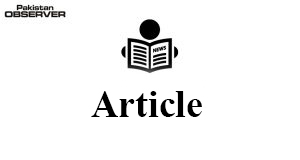Dr M Athar Khan
THE part of the fig. 1 marked ‘Profession’ depicts in arched and horizontal forms aspects of teacher’s profession in terms of what the job of a teacher consists of. In the prophetic model of teacher’s personality and profession, the professional part of the model describes the areas in which a teacher has to be conversant to perform his job. These areas, as shown in the model include the following: 1. Concept of education that particularly relates to the profession of teaching and determines the nature and scope of the work of a teacher. 2. Educational psychology which covers all about the behaviour of the learner and the process of learning.3. Organization of teaching and learning is the main part of the teacher’s task. It relates to the why (purpose, goals and objectives of teaching), what (the curriculum) and how (methods and strategies of teaching) of all that is implied in the overall concept of teaching or pedagogy. 4. Student guidance to facilitate student learning and help him become well adjusted and productive member of the society, and finally, 5. The goal of education which is the focus of whole act and process of teaching and learning. It is the sole determinant of what the education is and what it should be.
Madrassah as concept of Islamic Institution of Education derives all its concepts, systems, and principles and methods of instruction from the text of the Qur’an and teachings of the Holy Prophet (SAW), which together constitute the overall conceptual framework of the Madrassah. The present day content of programs of professional education and training of teachers are based upon the modern concepts of educations which are for most parts derivatives of the western thoughts and literature on education. However, as they relate to the Madrassah they have definite Qur’anic context and each of them has its own unique meaning and significance in reference to the Madrassah. Concept of education: In Madrassah, as it is defined with reference to Iq’ra, Ilm, Ibaadah and Kasab, education denotes process and mechanism of realization and development of human attributes and capabilities to fulfil the mission (as Khalifah) and purpose of creation (Ibaadah) of man as it is emphatically stated in the verses of the Qur’an.
The term process denotes systematic steps and stages of accomplishing tasks and achieving objectives for attaining a predetermined purpose or goal. In education it implies proceeding systematically in accordance with the hierarchical order of Ilm beginning with knowledge base of language and culminating at science the highest level of human intellect. Mechanism in reference to Madrassah denotes appropriate use of principles, methods, means and material of teaching and learning for realization and development of human. The word realization implies both awareness and achievement. In relation to education it connotes awareness of one’s self and what one can and has to achieve in life as man and a human entity. Development in reference to Madrassah education means identification and maximization of human attributes and capabilities in the light of Iq’ra, Ilm, Ibaadah and Kasab.
Educational Psychology, as a field of study within the discipline of psychology is the development of the turn of the 19th Century. Origin and development of educational psychology as it is known today is the result of American psychologist E L Thorndike’s experiments on animal learning behaviour in laboratory situations. In essence the theoretical basis of educational psychology is reflective of Charles Darwin’s view of animal origin of the mankind. It postulates that principles and methods of learning which apply to and regulate animal learning are equally applicable to humans also. Educational psychology in all its aspects is synonymous with the psychology of learning. It is however, important to know that the theories of learning that have been developing since presentation of Thorndike’s theory of learning, show a marked reaction to and deviation from the Darwinian bases of Thorndike’s theory of learning as they tend more to emphasize “human aspects” in human learning behaviour.
In comparison to the modern view of educational psychology, the Qur’anic educational psychology is far older as it is based on the facts contained in the verses of the Qur’an (as opposed to the data obtained from human observations in the natural or artificially created laboratory situations), which was revealed a millennium and a half ago in the past. It is also of no less importance to note that the Qur’anic educational psychology is also opposed to the modern view of educational psychology, which focuses and deals with the aspects and mechanisms of learning, and the principles that regulate learning in humans and animals. The Qur’anic view of educational psychology emphasizes teaching as the focus of education as it is clearly implied in the meanings of the Qur’anic verses, “Then Allah taught Adam the names of all things and said to the angels, “If you are right then tell me the names of these things” (2:31), and “They said, “Glory to You! We have no knowledge except what You taught us.” (2:32). The Qur’anic psychology of teaching is founded on the concepts of Man, Ilm teacher and principles and methods of teaching as they have been described in the verses of the Qur’an.
—The writer is Prof & Advisor to the VC, Sarhad University, Peshawar.










